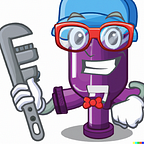Building a Self-Mutating CDK Pipeline
As a DevOps Engineer, I always strive to automate repetitive tasks and create seamless workflows. When working with AWS CDK (Cloud Development Kit) and GitHub, I wanted to create a pipeline that would update itself whenever changes were made to the pipeline’s code. In this blog post, I will walk you through the steps to create a self-mutating CDK pipeline for CDK code from GitHub, using AWS CDK and AWS CodePipeline.
Prerequisites
Before we dive into the steps, make sure you have the following:
- AWS CLI installed and configured: https://aws.amazon.com/cli/
- AWS CDK installed: https://docs.aws.amazon.com/cdk/latest/guide/getting_started.html
- A GitHub account and a repository with your CDK code.
Step 1: Set up the CDK project
To start, let’s create a new CDK project. Use the following command to create a TypeScript CDK project:
cdk init app --language typescriptNext, add the required dependencies:
npm install @aws-cdk/core @aws-cdk/aws-codepipeline @aws-cdk/aws-codepipeline-actions @aws-cdk/pipelinesStep 2: Define the pipeline stack
In the lib folder, create a new file called self_mutating_pipeline_stack.ts. In this file, define a new class that extends cdk.Stack:
import * as cdk from '@aws-cdk/core';
import * as codepipeline from '@aws-cdk/aws-codepipeline';
import * as codepipeline_actions from '@aws-cdk/aws-codepipeline-actions';
import * as pipelines from '@aws-cdk/pipelines';
export class SelfMutatingPipelineStack extends cdk.Stack {
constructor(scope: cdk.Construct, id: string, props?: cdk.StackProps) {
super(scope, id, props);
// Your pipeline definition will go here
}
}Step 3: Define the GitHub source action
To define the GitHub source action, you’ll need a personal access token from your GitHub account. Follow the instructions here to create one: https://docs.github.com/en/authentication/keeping-your-account-and-data-secure/creating-a-personal-access-token and add it to your secret manager in aws console.
With the token in hand, add the following code to the SelfMutatingPipelineStack constructor:
const sourceArtifact = new codepipeline.Artifact();
const cloudAssemblyArtifact = new codepipeline.Artifact();
const sourceAction = new codepipeline_actions.GitHubSourceAction({
actionName: 'GitHub_Source',
owner: 'your-github-username',
repo: 'your-github-repo',
branch: 'main', // or your preferred branch
oauthToken: cdk.SecretValue.secretsManager('your-github-token-secret-name'),
output: sourceArtifact,
});Make sure to replace 'your-github-username', 'your-github-repo', and 'your-github-token-secret-name' with the appropriate values.
Step 4: Define the pipeline
Now, we’ll define the pipeline and add the source action:
const pipeline = new pipelines.CdkPipeline(this, 'Pipeline', {
cloudAssemblyArtifact,
sourceAction,
});Step 5: Add the pipeline to the CDK app
Finally, open the bin folder and edit the your-app-name.ts file to include the self-mmutating pipeline stack:
#!/usr/bin/env node
import 'source-map-support/register';
import * as cdk from '@aws-cdk/core';
import { SelfMutatingPipelineStack } from '../lib/self_mutating_pipeline_stack';
const app = new cdk.App();
new SelfMutatingPipelineStack(app, 'SelfMutatingPipelineStack');Step 6: Deploy the pipeline
With the pipeline defined, it’s time to deploy it. Run the following commands to build and deploy your pipeline:
npm run build
cdk deployAfter deployment is complete, navigate to the AWS CodePipeline console to view your pipeline: https://console.aws.amazon.com/codepipeline/
Step 7: Test the self-mutating pipeline
To test the self-mutating pipeline, make a change to your CDK code in the GitHub repository, and push the changes to the specified branch. The pipeline will automatically trigger and update itself based on the latest changes.
Conclusion
In this blog post, we’ve created a self-mutating CDK pipeline for CDK code from GitHub, allowing for seamless updates and continuous deployment. This pipeline can be further extended to include additional stages and actions, such as deploying your CDK apps to different environments (e.g., development, staging, and production).
By leveraging the power of AWS CDK and AWS CodePipeline, you can create automated, scalable, and maintainable workflows for your development process, enhancing the overall efficiency and quality of your DevOps practices.
